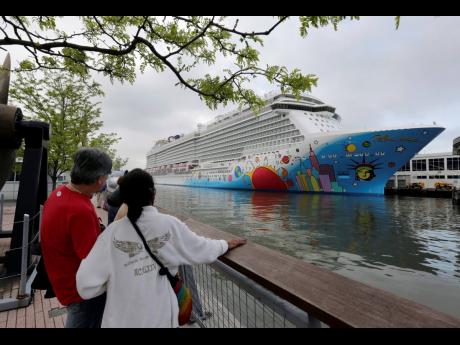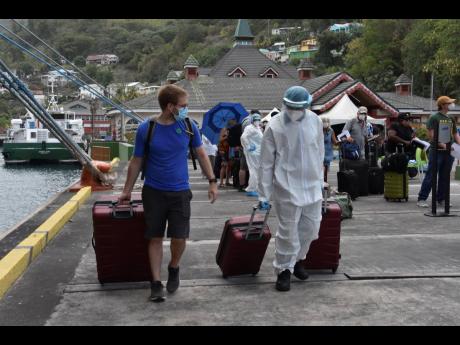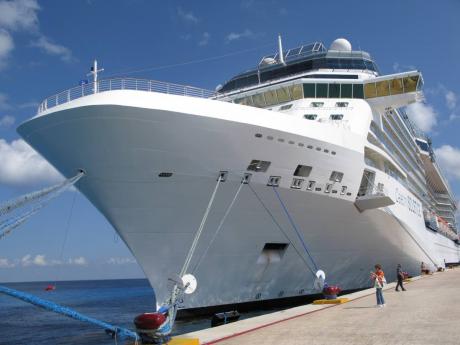Caribbean cruise ecstasy a potential nightmare
When Celebrity Cruises’ Celebrity Millennium pulled into the Bridgetown Port in Barbados on Monday, June 7, there was no hiding the sheer delight of local tourism officials and government representatives.
Sailing out of the home port of Phillipsburg in St Maarten, Barbados was the first stop for the Royal Caribbean Group vessel, which was the first major cruise ship to set sail with US passengers since COVID-19 forced all cruise lines to drop anchor in March of last year.
The 500 passengers – 75 per cent of whom, along with all 700 crew, were “fully vaccinated”, according to the cruise line – were greeted with steel band music and a brief welcoming ceremony, which included speeches by giddy officials.
But their moment of ecstasy was tempered by the stark reality that two persons on-board the vessel – who were in the same cabin and, it was later revealed, had gone on a shore excursion in Barbados – had tested positive for COVID-19.
“Today, two guests sharing a stateroom on-board Celebrity Millennium tested positive for COVID-19 while conducting the required end of cruise testing,” the cruise line said in a statement on Thursday. “The individuals are asymptomatic and currently in isolation and being monitored by our medical team.”
Since the cruise lines announced recently that they would begin offering cruises from home ports in the Caribbean – seemingly to circumvent the no-sail order by the US Centers for Disease Control and Prevention (CDC) – regional public health officials have been having nightmares over possible COVID-19 outbreak on ships.
The large numbers of passengers – often larger than the populations of some small Caribbean states – packed in the confined space of a cruise ship offer increased opportunities for the spread of COVID-19 and other infectious diseases, warned the Caribbean Public Health Agency (CARPHA), the regional equivalent of the CDC, in a document to Caribbean leaders containing guidelines for the return of cruising.
They’ve seen this before with frequent outbreaks of norovirus, often referred to as the cruise ship virus, and other gastrointestinal outbreaks on Caribbean cruises over the past 10 years.
In the guidelines document dated May 31, a copy of which was obtained by The Sunday Gleaner, CARPHA pointed to the public health challenges posed by the ships due to the speed at which they travel from one port to another and the ease with which infected passengers and crew can spread communicable diseases among local populations.
“In addition to the increased risk of disease spread on the ships, the influx of large numbers of passengers … from different countries, some of whom may be asymptomatic carriers, possibly carrying different variants into ‘virgin’ Caribbean populations that have not been fully vaccinated, as well as the fact that vaccinations have not been shown to fully stop disease transmission, poses increased risk to CMS [CARPHA member countries],” the health agency stated, which recommends proof of negative PCR tests taken 24-72 hours before boarding, full vaccination requirements and a 14-day quarantine for crew members immediately before or upon boarding the ship to prevent the introduction of the virus on-board.
A VEXING ISSUE
Vaccination requirements have become a vexing issue, as the Republican governor of Florida, Ron DeSantis, signed a law making it illegal for businesses, including cruise lines, to ask customers whether they’ve been vaccinated against the virus. Texas governor Greg Abbott, also a Republican, has signed a similar law.
Governor Albert Bryan Jr of the US Virgin Islands has since written to DeSantis, pleading with the Florida Republican to reconsider the legislation, arguing it could impact the health and well-being of millions of Caribbean residents when cruises to the region resume. Few expect DeSantis to accede to this request.
DeSantis, who leads a state where 42 per cent of the population is fully vaccinated, has opposed every measure introduced by the CDC to manage the spread of COVID-19, including the wearing of masks and social distancing.
He also sued the CDC to try to force it to lift the no-sail order introduced in mid-March 2020 following COVID-19 outbreaks and deaths on multiple ships. The health protection agency has implemented strict health and safety guidelines for cruise lines to resume sailing in US waters.
Major cruise companies – Carnival, Norwegian and Royal Caribbean – all had vowed to defy DeSantis, but in a dramatic surrender, Royal Caribbean announced last Friday that it would no longer ask for such proof of vaccination.
This complicates matters for Jamaica and other cruise destinations in the Northern Caribbean visited by the majority of ships that sail out of Miami, argues Neville Boxill, a former second in command at the Barbados Tourism Marketing Inc, where he had responsibility for cruise.
“A lot depends on how the consumers respond to that, whether consumers also would prefer the safety of being on a ship where they know everybody else has been vaccinated or whether they’re going to take the same attitude as the governor,” Boxill told The Sunday Gleaner.
“If they take the same attitude as the governor, then that creates a real dilemma for the Caribbean destinations, as they will now have to make a decision as to whether they refuse cruises out of Miami or whether they accept cruises out of Miami.”
The former tourism executive, who now heads his consultancy firm, Kusafiri Consulting, concludes that if the cruising public fails to back the Florida governor, the decision by Royal Caribbean could be a blessing in disguise for the Caribbean destinations – Antigua and Barbuda, Barbados, Bahamas, Bermuda, Dominica Republic, Jamaica, and St Maarten – which have agreed to serve as home ports.
Based on the model, this may mean increased airport revenues from landing and parking fees, terminal charges and concessionaire revenues, capacity support of point-to-point air services, an opportunity for the entire cruise ship passenger capacity to be exposed to, and experience what the destination has to offer and opportunities for the agriculture, manufacturing and services sectors to benefit from cruise ship provisioning, explained Boxill.
BROKEN DREAM
However, homeporting can leave the Caribbean with “broken dreams, high-and-dry and exploited”, surmised Jim Walker, a Miami, Florida-based lawyer and publisher of the maritime law blog, Cruise Law News.
The decision to make Barbados the first stop upon the resumption of cruising was, in part, to repay the country for allowing 28 cruise ships safe harbour when they “were floating throughout the Caribbean, doors were shut on us; we did not have any place to go”, admitted Joshua Carroll, vice-president of destination development at the Royal Caribbean Group.
Royal Caribbean International has also announced plans to operate cruises from Barbados for the first time starting in December 2021.
While the ships decorated Barbados’ waters during the early months of the pandemic, something unwholesome was happening beneath the surface, according to results of a study by the Centre for Resource Management and Environmental Studies (CERMES), at the Cave Hill Campus of The University of the West Indies.
“Thousands of square metres of reef were visually confirmed by divers to have been destroyed. The potential area of habitat damage from all anchoring events was estimated to be in the region of millions of square metres,” wrote Robin Mahon, professor emeritus at CERMES, in a newspaper report, in which he explained that there appeared to have been inadequate understanding of the potential damage caused by anchoring such large ships, as well as inadequate surveillance of exactly where anchoring was taking place.
There’s also the issue of air and water pollution, “although, quite frankly, it is an issue almost totally lacking in the discussions between the cruise lines and the Caribbean”, noted Walker, the maritime law blogger, who described the motto of his blog as: “Everything the cruise lines don’t want you to know”.
“The Miami-based cruise industry has a poor record of managing the enormous pollution caused by its bunker fuel burning huge ships and, in my view, treats many Caribbean islands as a dumping ground,” he told The Sunday Gleaner.
POOR LONG-TERM PARTNERS
The experts agree that homeporting requires extensive and costly port and airport facilities to transport and deliver food and equipment for the ships and handle the thousands of tourists arriving to board the ships and then leave after their cruises.
And, given the seasonal nature of the cruise industry, “infrastructural and other assets acquired to facilitate cruise operations will often be underutilised for the majority of the year, worsening the cost-benefit equation applied to homeporting operations”, Boxill concluded.
Worse yet, added Walker, there’s little doubt that the cruise lines will return to homeporting in South Florida as soon as they are able to do so, leaving the Caribbean countries “high and dry”.
Norwegian, which had earlier announced that Montego Bay would serve as home port for the Norwegian Joy from August, revealed late last month that it had cancelled those plans and would transfer the crew to the Norwegian Bliss, which is scheduled to sail from Seattle to Alaska from August 7, pending approval from the CDC.
And last week, the line advised passengers who were due to sail from La Romana in the Dominican Republic on August 15 that its plans had changed. Royal Caribbean has also reversed an earlier decision to home port out of Bermuda.
While neither line stated expressly that these cancellations are in preparation for the resumption of cruising from the US, industry observers are certain there’s no other reason.
“Cruise lines are poor long-term partners. They will always leave when they can find a better deal. If the lines detect a reluctance of US customers to fly to Jamaica or other locations in the Caribbean, they will not hesitate to pull out,” Walker contended.
And in a strong warning that Caribbean countries will forever get the short end of the stick in dealing with the cruise companies, he called for a cooperate-approach to negotiations.
“I would tell any Caribbean country thinking about investing in a home port arrangement with a cruise line the following – caution: you are dealing with a proverbial eight-hundred-pound gorilla,” warned Walker. “Do not expect the cruise lines to treat you as their equal partner. Do not expect a Miami-based cruise line to replace its home port with Montego Bay, or Nassau, or Cozumel, or Bridgetown.”



